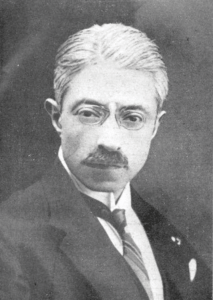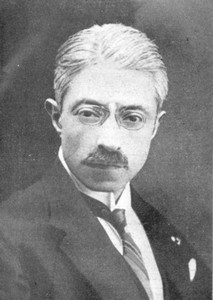
Emil Stanisław Rappaport (1877-1965) was a Polish lawyer (scholar, law-maker, defence attorney, judge) and co-founder, in 1924, of the Association Internationale de Droit Pénal (AIDP), one of the major legal professional associational involved in the development of international criminal law. He was also a Vice President of the International Bureau for the Unification of Criminal Law, which coordinated the works between conferences of AIDP, in the period 1928-1939. He organized the first criminal law unification conference in Warsaw in 1927 where the catalogue of international crimes and principles of responsibility for them were discussed. One of Rappaport’s major contribution to international law was his activism (already during the interwar period) for the criminalization of public incitement to a war of aggression. Rappaport argued that aggressive warfare was already considered a crime and subsequent steps had to be taken to codify and condemn propaganda for such a crime. He militated for the recognition of prohibition of war propaganda as a crime under the law of nations (delicta iuris gentium) and incorporation of this prohibition in national criminal laws. He argued that all states should have obligation to prosecute international crimes (the universality principle). After World War II, in line with his general focus on enforcement law, Rappaport became active in the Societé International de Défence Sociale/Centro Internazionale di Studi di Difesa Sociale (SIDS) in the framework of which the penal policy and the question of resocialization was discussed.
Rappaport graduated in law from the University of Warsaw in 1901. He finished complementary courses during studies in Paris (1903–1904, 1909-1910), Berlin (1904–1905 – he attended Franz von Liszt’s seminar), and London (1909). He earned a doctorate in law at the University of Neuchâtel in Switzerland and he conducted his habilitation - veniam legendi at Jan Kazimierz University in Lwów in 1920 based on his works devoted to national and international criminal law. In 1937, he was awarded a professorship in criminal law at the Free Polish University in Warsaw. Due to political reasons (i.e. Russian repressions against lawyers of Polish origins), he could not be appointed judge immediately after his apprenticeship in Riga and bar exam in 1904, so the pursued a career as a defence attorney between 1906-1917. He was engaged in the defence of political prisoners in Russian courts, cooperating with Stanisław Patek and Stefania Sempołowska – leaders of the circle of attorneys who were defending those accused in political trials. In the newly established, after WWI, state of Poland, he was appointed as a judge of the Polish Supreme Court in 1919 where he served until 1951 (with a break during WWII). Between 1947 and 1951 he prosided the Criminal Chamber of the Supreme Court (thus he could observe the progressive Stalinization of the judicial system of Poland).
On national level, Rappaport acted as the Secretary General of the Codification Committee in the period 1924-1932. The role of committee was enormous as it was supposed to codify and unify the law for the whole Poland (composed of the regions which before the end of WWI were in the jurisdiction of three different legal systems – Russian, Austro-Hungarian and German). Together with Aleksander Mogilnicki, he presented the first draft of the Polish criminal code (based on the Russian code of 1903). He was the author of the Article 113 of the Polish Criminal Code of 1932 - referred to as lex Rappaport, which penalized public incitement to a war of aggression (§ 1. Whoever incites the public to a war of aggression is punishable by imprisonment for up to 5 years. § 2. Prosecution follows only if the conduct specified in § 1 is punishable under the law of the state against which the incitement is directed). This proves that Rappaport was a real pioneer of criminalizing war propaganda. Similar provisions were introduced e.g. in Romanian criminal code of 1936 (Article 229) due to Vespasian Pella’s involvement. After World War II, he was judge sitting on the Supreme National Tribunal in the case against former Nazi criminal Arthur Greiser (1946). The final verdict, allegedly wrote by Rappaport, was the first judgement (issued before the Nuremberg Tribunal verdict) in which a defendant was sentenced for involvement in the war of aggression and in “biological and cultural extermination (genocide) of neighbouring nations”. However, the final sentence was death penalty, a punishment which Rappaport ferociously opposed through the whole his life.
Rappaport is well known from his controversial book Naród Zbrodniarz. Przestępstwa hitleryzmu a naród niemiecki. Szkic analityczny, przestępczości i odpowiedzialności osobowo-zespołowej (A nation that is a criminal. Hitlerite crimes and the German nation. Analytical comments on criminality and individual-collective responsibility) published 1945 where he argued that the whole German nation should bear responsibility for the war of aggression as it was not Hitler that made a Hitlerite German possible, but rather a Hitlerite Germany created Hitler. Among the criminal-security measures which he recommended was to: force German men to rebuild destroyed Europe; support voluntary emigration of German population outside Europe and change the economy of Germany from industrial to agricultural one.
Patrycja Grzebyk (Wrasaw University)
Bibliography
-
Grzebyk Patrycja, ‘Emil Stanisław Rappaport. His Road from Abolition to Prosecution of Nations’ in: Frédéric Mégret, Immi Tallgren (ed.), The Dawn of a Discipline. International Criminal Justice and Its Early Exponents, Cambridge University Press, Cambridge 2020, pp. 93-117
-
Rappaport Emil Stanisław, La loi de pardon: étude analytique des projets français (Recueil Sirey, Paris, Attinger Fréres, Neuchâtel 1911)
-
Rappaport Emil Stanisław, Rys zasad prawa karnego międzynarodowego. w świetle ustaw karnych obowiązujących w Królestwie ma tle porównawczym (1918)
-
Rappaport Emil Stanisław, La baquerote dans la legislation moderne comparée (Tenin, Paris 1927)
-
Rappaport Emil Stanisław, Le problème de l’unification internationale du Droit Pénal (1929) 12 Revue Pénitentiaire de Pologne 1
-
Rappaport Emil Stanisław, ‘Propagande de la guerre d’agression comme délit du droit des gens’ (Warszawa 1929)
-
Rappaport Emil Stanisław. Konferencja Międzynarodowej Unifikacji Prawa Karnego a jej poprzedniczki (Łódź 1934)
-
Rappaport Emil Stanisław, Naród Zbrodniarz. Przestępstwa hitleryzmu a naród niemiecki. Szkic analityczny, przestępczości i odpowiedzialności osobowo-zespołowej (Wydawnictwo i Nakład Spółdzielnia Dziennikarska „Prasa”, Łódź, 1945)
-
Rappaport Emil Stanisław, ‘Ludobójstwo jako delictum iuris gentium w kodeksach karnych krajowych’ (1948) 9-10 Państwo i Prawo 55


